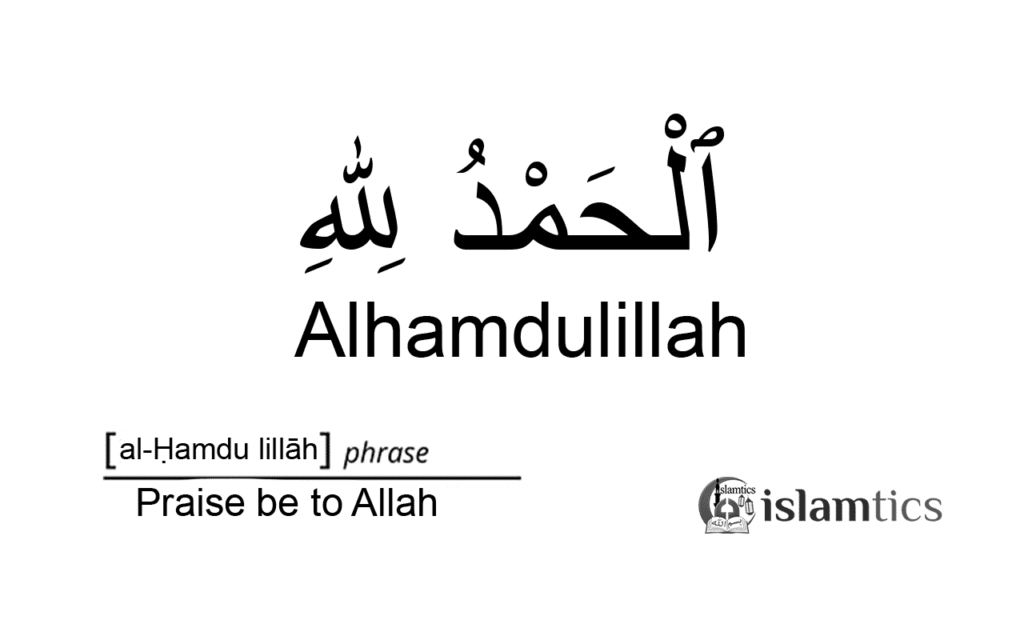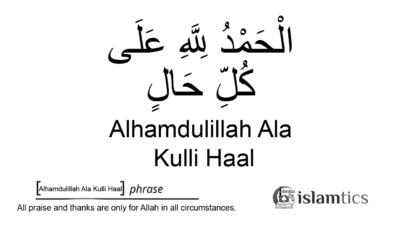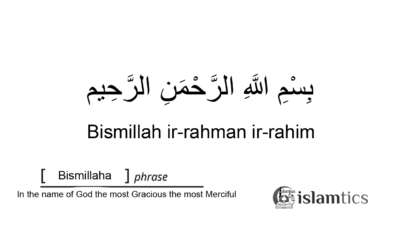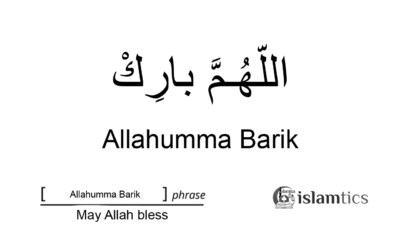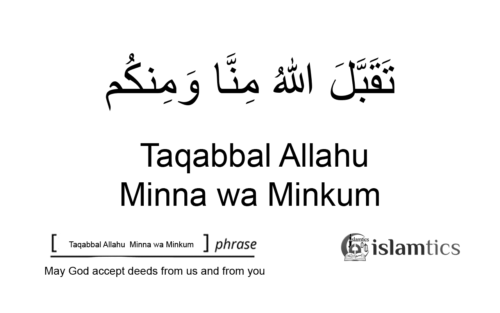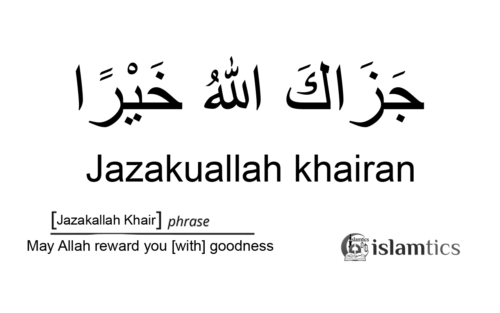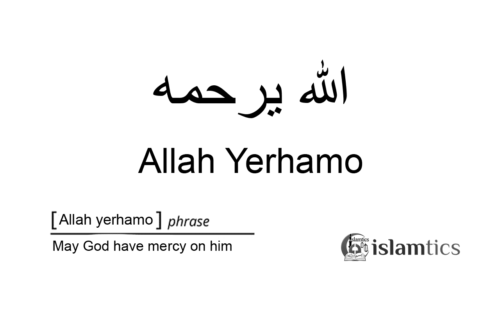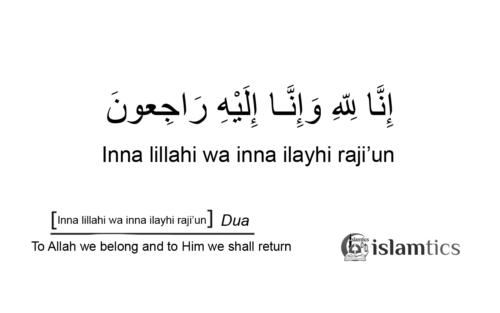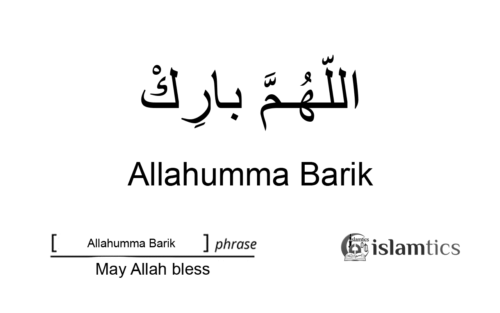Alhamdulillah (ٱلْحَمْدُ لِلّٰهِ) is a powerful Arabic expression that holds a deep significance in the lives of Muslims as they use it in their conversations in a way that means ‘ all praise be to God’. It is mentioned on the 1st page of the Quran, and Hadith, as well as Muslims, recite it at least twice in every prayer.
It serves as a profound expression of faith, gratitude, and surrender to Allah’s will. It reminds Muslims to be grateful for the blessings they have been bestowed with and to approach life’s challenges with patience and trust in Allah’s wisdom.
It is a simple yet powerful phrase that encapsulates the heart of Islam and the enduring belief that all praise and thanks belong to Allah alone.
Table of Contents
Pronunciation
The following video we have made will help you learn the proper pronunciation of the phrase word by word:
Alhamdulillah Meaning
The word Alhamdulillah means “Praise be to Allah”. It is an expression of both praise and gratitude to Allah. It teaches a believer to be grateful in all turns and phases of life, be it good or bad.
It is a statement of faith when uttered during difficulty in life. It is a statement of gratitude even when some desires are denied by Allah. It is a statement of purity and submission to Allah. It is a statement of understanding of Islam. It is the statement of ultimate contentment and abiding by Allah’s will.
There are four possible English translations of Alhamdulillah, all of them very similar:
- “All praise is due to Allah.”
- “Praise be to Allah.”
- “All praise is due to Allah alone.”
- “All the praises and thanks be to Allah.”
Alhamdulillah in Arabic
The beauty of Alhamdulillah lies in its simplicity and universality. It is a phrase that transcends language barriers and cultural boundaries, resonating with Muslims of diverse backgrounds. Alhamdulillah in Arabic consists of 2 words which are written in Arabic with the Diacritical as:
ٱلْحَمْدُ لِلّٰهِ
and Without the Diacritical:
الحمد لله
And it is broken down as the following table:
| The praise | ٱلْحَمْدُ | Al-hamdu |
| to Allah | لِلّٰهِ | lillah |
When to Say Alhamdulillah
Muslims use Alhamdulillah in a variety of situations as the following:
1. Expressing general gratitude: Muslims may also say “Alhamdulillah” as a way of expressing gratitude for the blessings they have in their lives, such as food, shelter, family, and other basic necessities.
Example: Alhamduliillah for having food on our table.
2. Receiving Good News: It might be used as a response to receiving good news or experiencing a positive event such as achieving success, good health, or any form of favor, as a way of acknowledging that it is a gift from Allah and to show gratitude for His blessings.
Example: I got accepted into the university! Alhamduliillah
3. Overcoming a difficulty or hardship: It can also be used When facing challenges or as a way of accepting and surrendering to difficult circumstances, as a way of trusting in Allah’s plan.
Example: I had a car accident and my car was badly damaged. Alhamdulillah Ala Kulli Kaal
4. In daily conversation: “Alhamdulillah” is commonly used in everyday conversation as a response to inquiries about one’s well-being or when expressing contentment and satisfaction with a situation or outcome.
Example: I’m good Elhamdulillah! And you, how is it going?
5. When someone sneezes: it is common for Muslims to say “Alhamdulillah” in response to someone sneezing. This practice is rooted in the teachings of Prophet Muhammad (ﷺ) and serves as a polite and caring gesture. It reflects the Islamic values of compassion, kindness, and concern for others’ well-being.
Alhamdulillah Benefits
There are many examples in the Quran and Hadith about the Benefits of Saying Alhamdulillah for its virtues of a positive mental attitude, perseverance, and optimism in the face of adversity here are some of them:
Praising Allah
The purpose of each and every Muslim on this planet is to obtain Allah’s acceptance. When we say Alhamdulillah, we praise and thank Him for everything we have and will ever have.
This mere act of thankfulness is accepted by Allah so much that He says: “If you are grateful, I will surely increase you in favor.” [Quran Ibrahim: 7]
We need to remember that Allah is not obligated to give us anything, therefore giving us whatever He has given us, is considered an enormous amount of mercy. Alhamdulillah.
Increased Blessings
Expressing gratitude for Allah’s blessings by saying Alhamudlliah can invite even more blessings into one’s life. Allah has promised to increase His favors upon those who are grateful, leading to a cycle of abundance and positivity.
Encourages Gratitude
Saying Alhamdulillah is praising Allah for the good things He gave you. This reminds us that all the happiness in our life comes from Allah. It keeps us humble and grateful.
Saying Alhamdulillah reminds you to be appreciative of all the things that Allah has given you, such as food and drink, family, good friends, and a home. It teaches us not to take anything for granted and to appreciate every little blessing.
Promotes Positivity
Every time we say Alhamdulillah, it reminds us of Allah. When something good happens, it makes us acknowledge how merciful Allah is. When things get hard, we turn to Allah for help. We cry in prayers and beg for his mercy to ease our pain and shower His blessings upon us.
However, it is the hard times that truly test your Iman. Instead of worrying and stressing uncontrollably, you should remain grateful to Allah when something bad happens and reminds yourself to stay positive.
Strengthen your Iman
To strengthen your Iman, you should be aware of Allah’s reward, compassion, and mercy for believers. Even if you spend every second of every day in gratitude and appreciation, it will still not be enough.
Saying “Alhamdulillah” strengthens an individual’s resilience in the face of trials and challenges. and reminds you that Allah is the creator and giver of everything. It makes us put our faith and trust in Allah and completely rely on Him.
Gaining Rewards:
Finally, expressing gratitude through “Alhamdulillah” is highly rewarded in Islam. It is considered a form of worship and a way to gain Allah’s pleasure and blessings.
Alhamdulillah in Quran
On the 1st page of the Quran Surah Al-Fatihah which is the first surah of the Quran and it begins with “Alhamdulillah rabbil alamin” which means “[All] praise is [due] to Allah, Lord of the worlds.” Every Muslim recites it at least twice whenever he performs Salat.
Quran also stresses thanking Allah for saving you from calamity by saying: “And ˹remember˺ when your Lord proclaimed, ‘If you are grateful, I will certainly give you more. But if you are ungrateful, surely My punishment is severe.’” [Quran 14:7]
Alhamdulillah Quotes
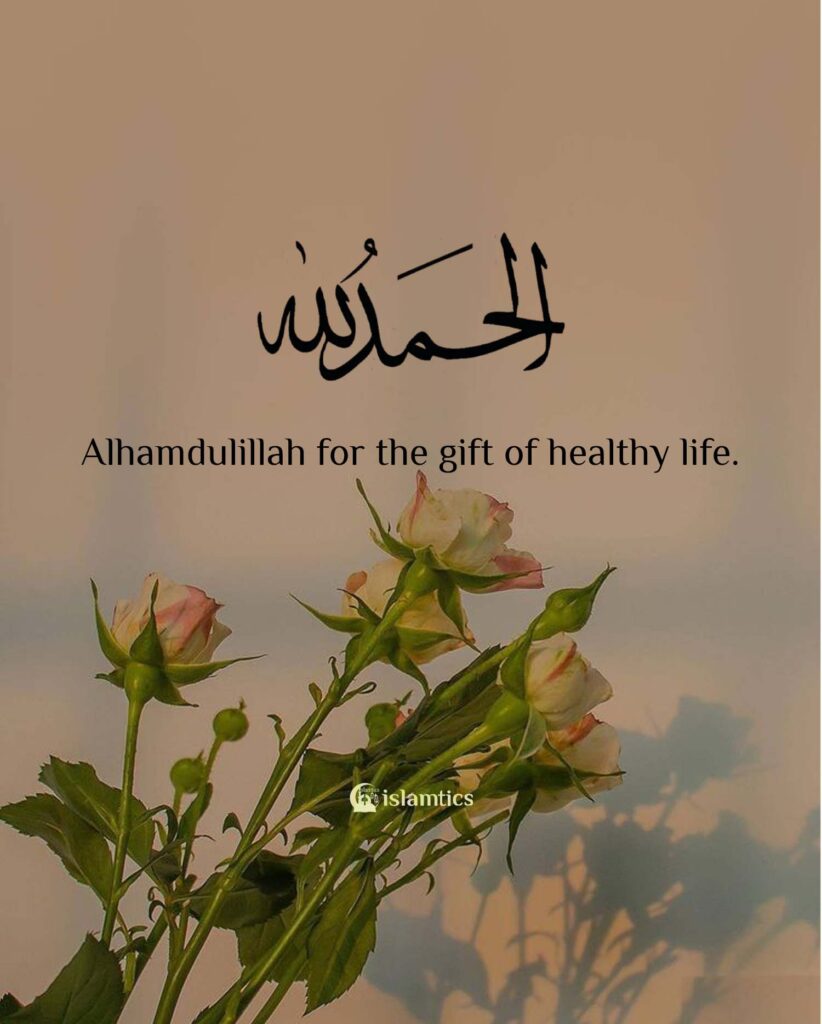
Alhamdulillah for the gift of healthy life.

One day you will smile and say Alhamdulillah
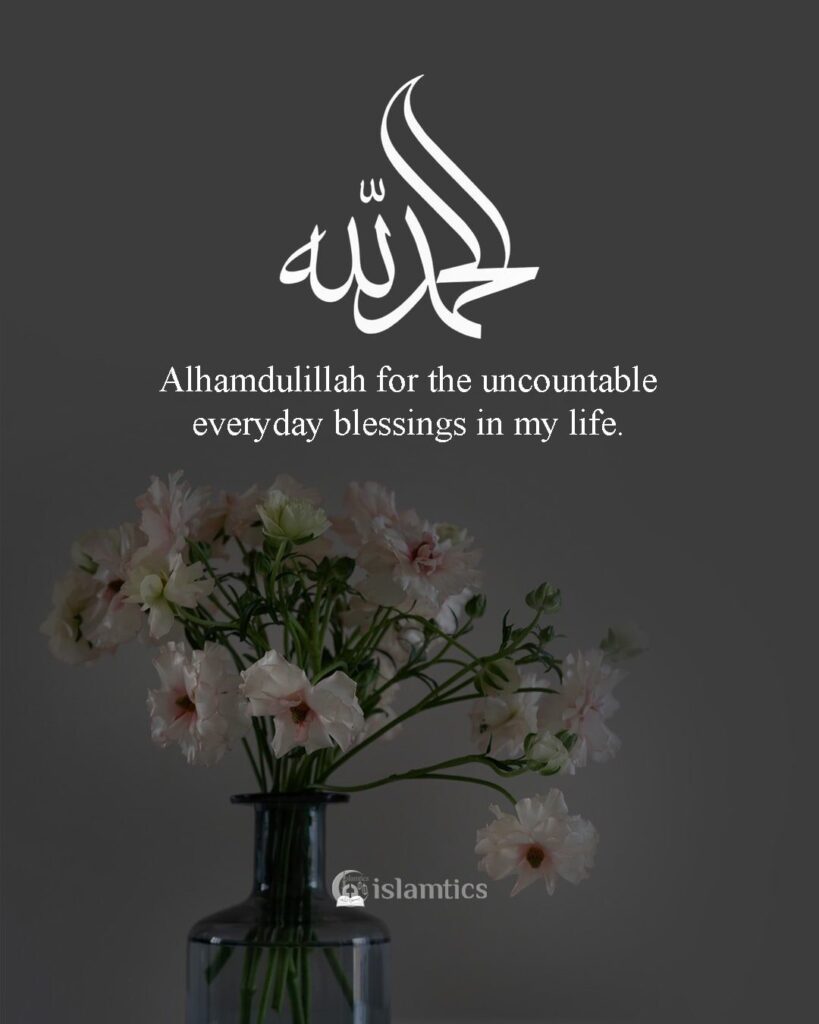
Alhamdulillah for the uncountable everyday blessings in my life.

Alhamdulillah for the blessing of waking up alive & healthy
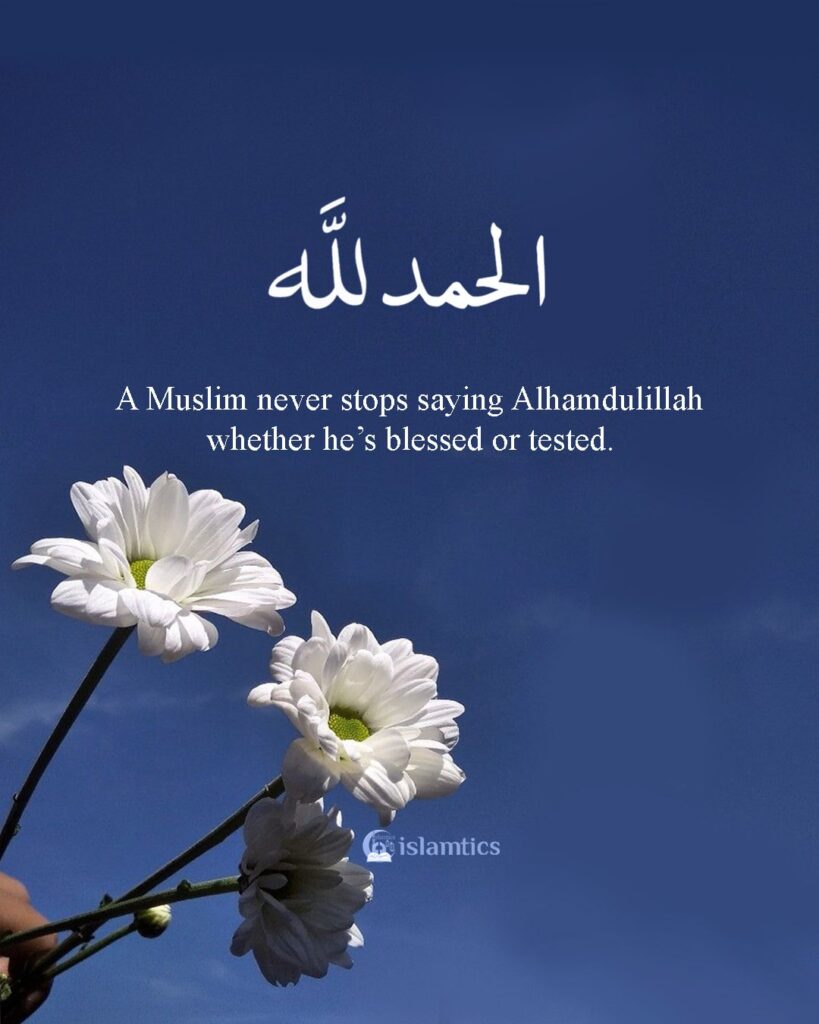
A Muslim never stops saying Alhamdulillah whether he’s blessed or tested
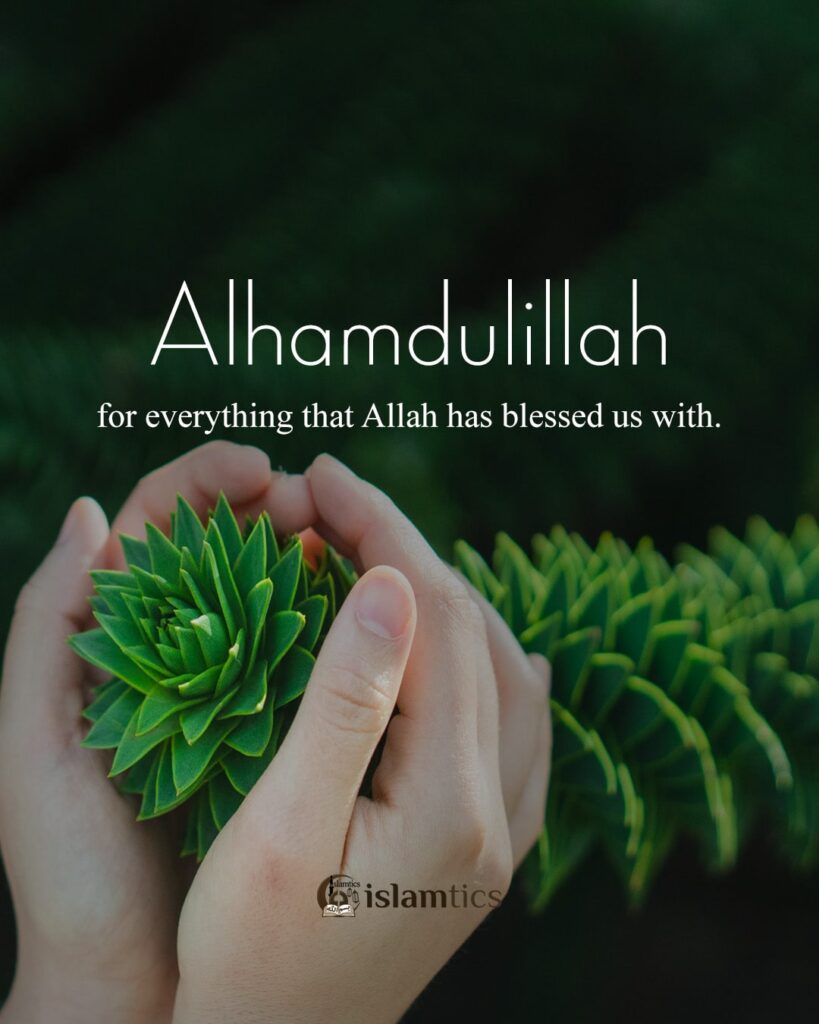
Alhamdulillah for everything that Allah has blessed us with.
For More Alhamdulillah Quotes click here
Alhamdulillah in Hadith
The prophet (ﷺ) said: “Purity is half of iman (faith). ‘Al-hamdu lillah fills the scales, and ‘subhan-Allah (how far is Allah from every imperfection) and ‘Al-hamdulillah (all praise and gratitude belong to Allah)’ fill that which is between heaven and earth.”
[Muslim]
Aisha reported: If the Messenger of Allah, (ﷺ), saw something he liked, he would say, “All praise is due to Allah, by whose favor good deeds are accomplished.” If the Prophet saw something he disliked, he would say, “All praise is due to Allah in every circumstance.”
[Sunan Ibn Mājah ]
the Prophet, (ﷺ) said, “When one of you sneezes, he should say, ‘Al-hamdulillah‘, When he says, ‘Al-hamdulillah ‘ his brother or companion should say to him [Yarhamuk-Allah], ‘May Allah have mercy on you.’ Then let the person who sneezed say [Yahdikum-ullah wa yuslihu balakum], ‘May Allah guide you and put your affairs in order.’” [Sahih (Al-Albani)]
Conclusion
We should say, “Alhamdullilah” for what we have; “Insha’Allah” for what we intend; and, “Subhana’ Allah” when we see something exciting or amazing. We should remember to say, “Astaghfir’Allah” when we lose our tempers or become weak, and most importantly, “Allahu Akbar” when we are faced with the challenges of life. These five phrases, said regularly, are like taking a multivitamin for holistic health.


